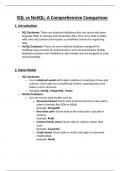Other
SQL vs NoSQL: Key Differences and Use Cases
- Course
- COMPUTER SCIENCE
- Institution
- Harvard University
This document compares SQL and NoSQL databases, highlighting their key differences in structure, scalability, and use cases. It explains when to use relational databases (SQL) for structured data and complex queries, and when to choose NoSQL databases for handling large-scale, unstructured, or semi...
[Show more]



